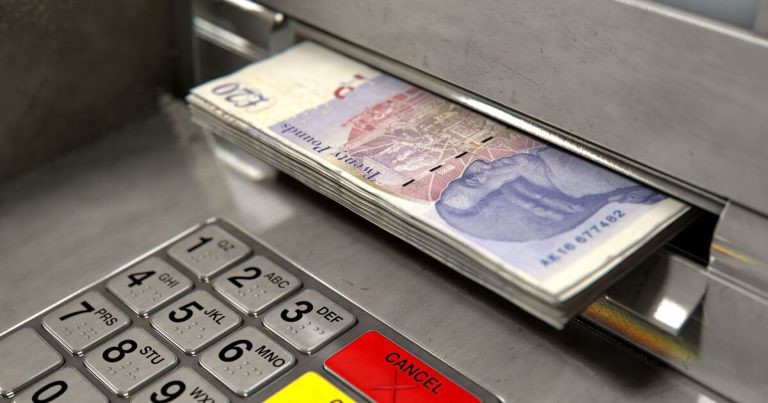

Savers warned about ‘disastrous consequences’ of accessing pensions early (Image: Getty)
Savers are being urged to “stop and think” before accessing their pension pot ahead of “peak withdrawals season” in April, May and June.
Flexible pension withdrawals traditionally spike at the start of the tax year, as savers take advantage of a fresh set of tax allowances.
The only exception to this was in 2020 when uncertainty caused by the pandemic saw savers pause or reduce withdrawals.
With Britons facing higher living costs due to persistently high inflation over the last two years, withdrawals could hit new highs in April, May and June 2024.
However, investment experts at AJ Bell are warning Britons of the “disastrous consequences” of this, and pensions should be the last asset savers touch.
READ MORE: Nine million pensioners face income tax demand – here’s how HMRC will target you

Pensions should be the “last asset” savers touch (Image: Getty)
Tom Selby, director of public policy at AJ Bell, said: “The start of the tax year is traditionally peak pension withdrawal season for people with defined contribution (DC) pensions, with hundreds of thousands of savers dipping into their retirement pot – many for the very first time – in order to take advantage of a fresh set of income tax allowances.
“This can be a perfectly sensible thing to do provided you have a well-thought-through withdrawal plan.”
However, Mr Selby noted that this time last year saw a “sharp spike” in withdrawals, with a record £4billion of taxable payments taken from pensions flexibly by 567,000 people during the quarter, at an average of £7,100 per withdrawal.
He added: “This represented a 17 percent increase in the value of withdrawals compared to the same quarter in 2022, with surging inflation undoubtedly a significant factor as many savers were forced to turn to their pension pots to make ends meet.
“While inflation is now cooling, the pain of two years of rising prices is still being felt by households, with millions braced for significant spikes in costs as they prepare to remortgage in a world of much higher interest rates.”
Given these ongoing pressures on Britons’ finances, Mr Selby noted that it’s likely another surge in pension access will take place over the next three months.
He said: “Anyone considering accessing their pension for the first time or hiking withdrawals to cope with rising living costs should stop and think before making a rash decision.
“Taking money out of your retirement pot early or withdrawing too much too soon could have disastrous consequences over the long term. What’s more, pensions benefit from generous tax treatment on death, meaning it often makes sense for your retirement to be the last asset you touch.”
Early access increases the risk of running out of money in retirement
Pensions can be accessed from age 55, with this minimum access age due to rise to 57 in 2028.

Accessing pensions early can run people the risk of running out of money in later life (Image: Getty)
For most people, Mr Selby said: “The aim of the game remains to provide an income to support your lifestyle throughout retirement. Withdrawing too much, too soon from your fund means you’ll increase the risk of running out of money early – and potentially being left relying on the state pension.”
Taking a 55-year-old with a £100,000 pension pot, Mr Selby suggested that, if they withdraw £5,000 a year, increasing annually in line with inflation at two percent, and enjoy four percent annual investment growth after charges, their fund could run out by age 80.
Early access could also mean missing out on investment growth
The sustainability problems created by taking an income early from your pension will be compounded if people miss out on investment growth simultaneously.
Mr Selby said: “While savers have total freedom over how to invest their retirement fund, it usually makes sense to take a bit less risk when you start drawing an income from your pot.”
Triggering a big cut in annual allowances
Mr Selby also warned anyone considering withdrawing taxable income from their retirement pot for the first time to be aware of the “severe impact” it will have on their ability to save tax efficiently in a pension in the future.
He explained: “Taking even £1 of taxable income from your pension flexibly will trigger the money purchase annual allowance (MPAA), potentially significantly reducing the amount you can save in a pension tax efficiently.
“Chancellor Jeremy Hunt at least reduced this cliff edge by increasing the MPAA from £4,000 to £10,000, but that is still a lot less than the £60,000 annual allowance.”
Additionally, Mr Selby noted: “If you trigger the MPAA you will lose the ability to ‘carry forward’ unused pensions allowances from up to three previous tax years.
“If you are struggling to make ends meet and your pension is the only asset available to support you, consider just taking your tax-free cash (or a portion of your tax-free cash) as this won’t trigger the MPAA.
“Alternatively, it is also possible to access up to three personal pensions worth £10,000 or less – and unlimited occupational pensions – without triggering the MPAA, provided you exhaust the entire pot in one go.”
Inheritance tax
Rules introduced alongside the pension freedoms mean savers can pass on leftover pensions completely tax-free if they die before age 75.
Mr Selby said: “Where the pension holder dies after age 75, the remaining funds will be taxed at their recipient’s marginal rate when they make a withdrawal.”
For those who want to leave assets to loved ones, Mr Selby said: “It often makes sense to leave as much of your pension untouched as possible in order to minimise your tax bill.
“This means when you come to flexibly access your pension for the first time, you should think not just of your retirement income strategy but also your IHT plans. If you have money held in an ISA, for example, this will count towards your estate on death.
“For those who want to pass their pension on to loved ones, it’s also important to ensure your nominated beneficiaries are up to date so the right people inherit your pot.”





